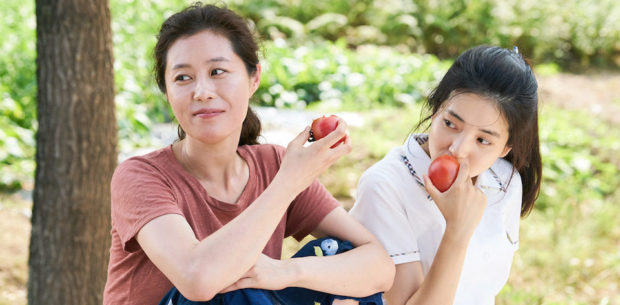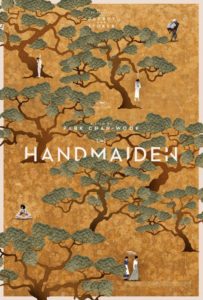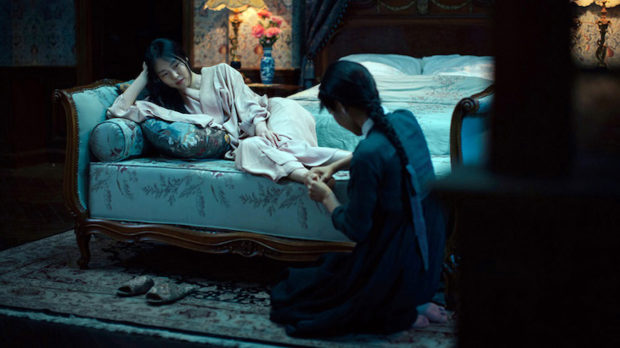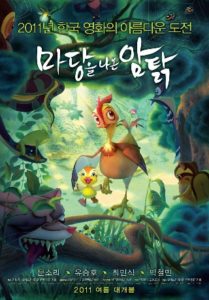There’s been a number of Korean remakes of Japanese films and dramas over the years, and 2018 alone has seen Be With You and Golden Slumber as box office hits. Yim Soon-rye’s LITTLE FOREST (리틀 포레스트) is actually a remake of two films from Junichi Mori, both of which were based on Daisuke Igarashi’s manga. Yet this compressed tale of self-discovery is actually ridiculously charming.
Frustrated by her life in the city, Hye-won (Kim Tae-ri, best known for The Handmaiden) returns to her childhood home in the country. Reuniting with friends Eun-Sook (Jin Ki-Joo) and Jae-Ha (Ryoo Joon-Yeol), she searches for her own meaning by farming and cooking. So much cooking.
There’s not a lot to LITTLE FOREST, even though it reduces an entire year’s worth of stories down to a comparatively bite-sized version of Igarashi’s tale. The manga creator’s work has often been compared to Hayao Miyazaki, although the unhurried structure that moves between past and present probably has more in common with Isao Takahata’s Only Yesterday that it does with Miyazaki’s magical realism.
The gentle and measured pacing, a sharp left turn for screenwriter Hwang Seong-gu (Anarchist from Colony), is structured around the seasons. (In the Japanese versions, the films are actually called Little Forest: Summer & Autumn and Little Forest: Winter & Spring respectively). The two main sources of drama are a tiny love triangle with Eun-Sook and Jae-Ha, although this is forgotten with the change, and Hye-won’s relationship with her estranged mother (played by Moon So-Ri, Kim Tae-ri’s The Handmaiden co-star). “It’s like I’m always competing with her,” she remarks when cooking.
It’s the cooking that provides the most gorgeous photography though, as Lee Seung-Hoon’s cinematography lovingly capturing all of Hye-won’s food porn moments. The passing of seasons is marked by different hues used for each chapter, as well as time-lapse moments of crops growing. Lee Jun-oh’s quirky synth score adds to the gentle happy vibe.
It might be trite to suggest that LITTLE FOREST is a little film, but it never has any want to strive for anything greater than quite self-reflection. Backed by a charming performances by Kim Tae-ri, it’s wonderful to see a film where the primary outcome is something as powerful as a young woman finding her place in the world.
[stextbox id=”grey” bgcolor=”F2F2F2″ mleft=”5″ mright=”5″ image=”null”] 2018 | South Korea | DIRECTOR: Yim Soon-rye | WRITERS: Hwang Seong-gu (Based on the manga by Daisuke Igarashi) | CAST: Kim Tae-ri, Ryu Jun-yeol, Moon So-ri, Jin Ki-joo | DISTRIBUTOR: Megabox Plus M, New York Asian Film Festival (US) | RUNNING TIME: 120 minutes | RELEASE DATE: 7 July 2018 (NYAFF), 9 August 2018 (KOFFIA) [/stextbox]
2018 | South Korea | DIRECTOR: Yim Soon-rye | WRITERS: Hwang Seong-gu (Based on the manga by Daisuke Igarashi) | CAST: Kim Tae-ri, Ryu Jun-yeol, Moon So-ri, Jin Ki-joo | DISTRIBUTOR: Megabox Plus M, New York Asian Film Festival (US) | RUNNING TIME: 120 minutes | RELEASE DATE: 7 July 2018 (NYAFF), 9 August 2018 (KOFFIA) [/stextbox]







